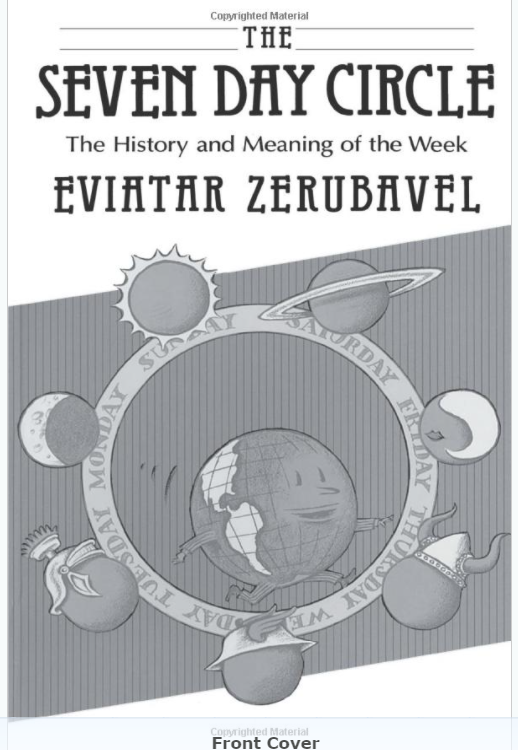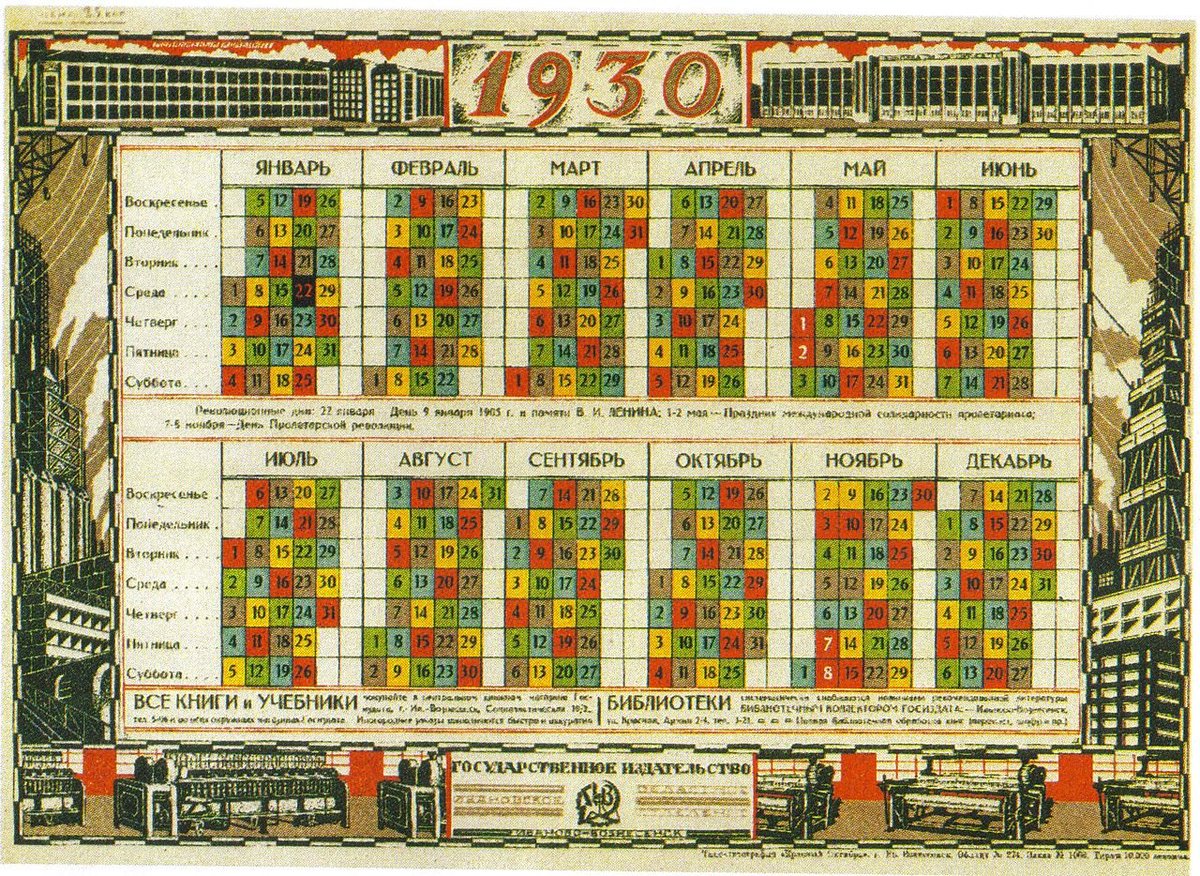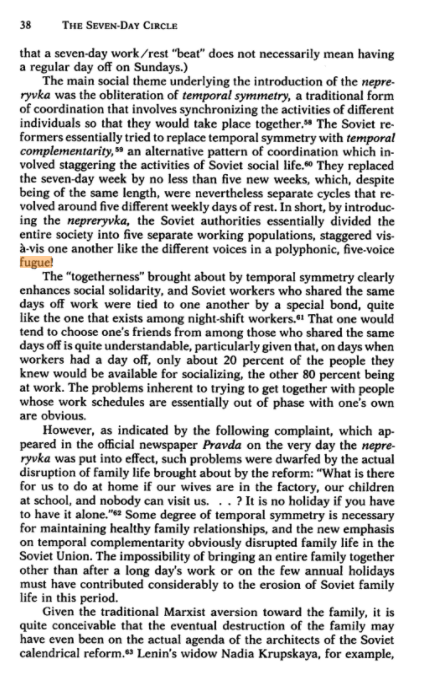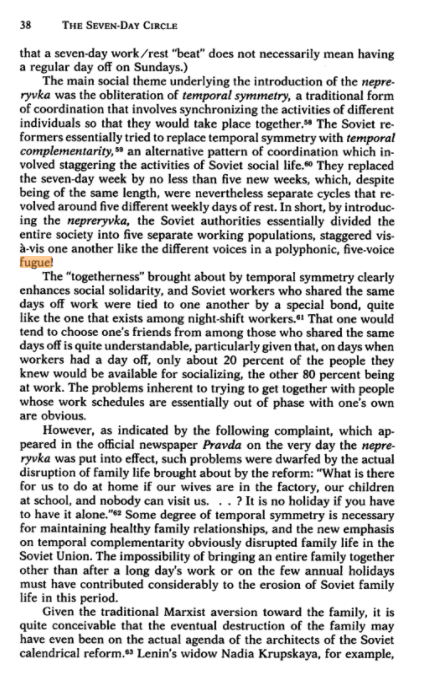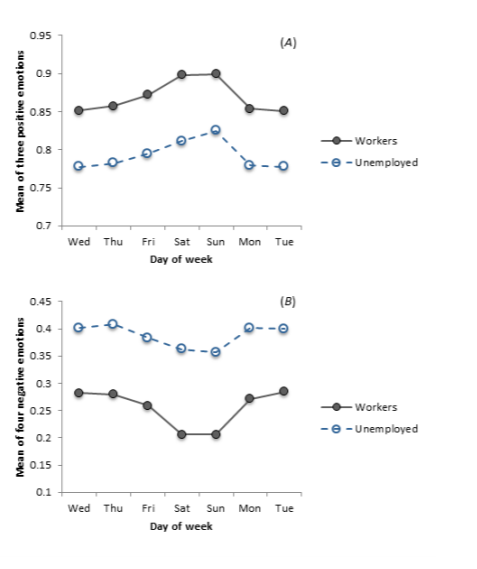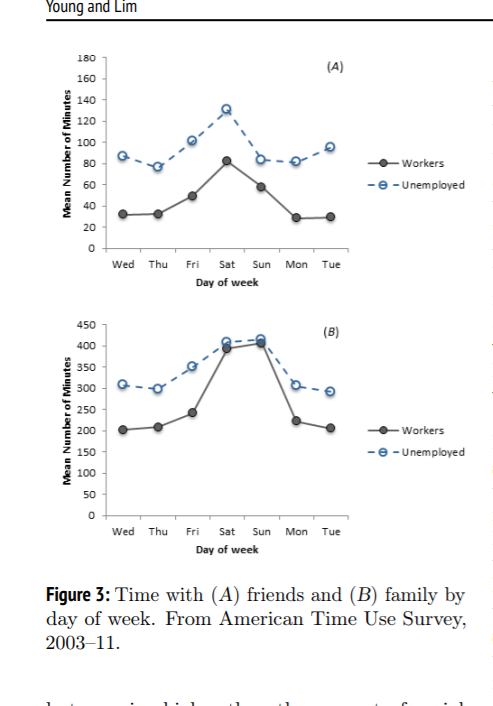Do you want to feel good about progress in the fight between the people & tyranny?
Step outside our US bubble & check out Russia
And think long-term: 100 years.... even more than 2500
And think about the social rhythms that govern our lives: The 7-day week.
<THREAD n=23> https://twitter.com/ford_nik/status/1355779749814132736
Step outside our US bubble & check out Russia
And think long-term: 100 years.... even more than 2500
And think about the social rhythms that govern our lives: The 7-day week.
<THREAD n=23> https://twitter.com/ford_nik/status/1355779749814132736
What do I mean?
The obvious reason to turn to Russia are the #navalnyprotests. Say what you want about recent American populist movements, but these Russians are risking their lives to oppose a murderous, kleptocratic tyrant. Inspirational.
But there's also a subtler reason:
The obvious reason to turn to Russia are the #navalnyprotests. Say what you want about recent American populist movements, but these Russians are risking their lives to oppose a murderous, kleptocratic tyrant. Inspirational.
But there's also a subtler reason:
The weekend.
Have you noticed that these protests have been occurring on Sundays, with a break in-between?
This is intuitive: Sunday is the obvious, natural day to hold protests. People work the rest of the week, right?
Have you noticed that these protests have been occurring on Sundays, with a break in-between?
This is intuitive: Sunday is the obvious, natural day to hold protests. People work the rest of the week, right?
Also, weekends are a natural "focal point" (h/t T. Schelling). If you ask someone 'When do you think protests are most likely?' they'll likely say 'Sunday' (& perhaps at noon).
Why?
Why?
Because it's common knowledge-- what everyone knows about what everyone knows-- that this is the most common non-work day (at least, in Christian-dominated countries like Russia & the US)
But here's the thing:
But here's the thing:
As laid out in Zerubavel's classic, the week isn't natural. It's a purely human institution (your pets don't know about it).
It emerged in the Jewish community 2500+ yrs ago & then diffused to the rest of the world via the Roman Empire, Xianity, Islam, & Western imperialism
It emerged in the Jewish community 2500+ yrs ago & then diffused to the rest of the world via the Roman Empire, Xianity, Islam, & Western imperialism
The week's artificiality is not news. In the last few hundred years, there have been several attempts to replace the week with alternative social rhythms.
The most notorious of these instances takes us back to Russia & a tyrant who was even more terrifying than Putin.
Who?
The most notorious of these instances takes us back to Russia & a tyrant who was even more terrifying than Putin.
Who?
I'm talking about Stalin of course.
To learn about Stalin's attempt to replace the week, see Zerubavel & see wikipedia https://bit.ly/3tgxwoC
Three key points to keep in mind:
To learn about Stalin's attempt to replace the week, see Zerubavel & see wikipedia https://bit.ly/3tgxwoC
Three key points to keep in mind:
1) Unlike other attempts, this wasn't just about changing the length of the cycle (as in French Revolution) or how it syncs with the calendar (as w League of Nations), but about *heterogeneous cycles*: Some people would have one day off, some people would have another.
2) It got further along than the others but it failed. Why? People power! See Zerubavel's summary. The key problem: Loved ones couldn't spend their days off together.
See also @cristobalyoung5 & @clim5 that demonstrates this effect in contemporary US: https://sociologicalscience.com/time-network-good/
See also @cristobalyoung5 & @clim5 that demonstrates this effect in contemporary US: https://sociologicalscience.com/time-network-good/
3) Now besides the explicit motivations for doing this, there's an obvious implicit motive:
Just as it makes it harder for people to get together socially, it makes it harder for people to assemble politically. What day will there be a critical mass for a demonstration?
Just as it makes it harder for people to get together socially, it makes it harder for people to assemble politically. What day will there be a critical mass for a demonstration?
So one can draw a direct line from Stalin's failure to kill the week to the threat that #navalnyprotests now pose to Putin. It may not have been mass protests that stopped Stalin. But it was a terrorized people's collective resistance to tyranny to preserve time for themselves.
OK, now you might think this aspect of the week/weekend as a check on tyranny is incidental, an unintended consequence that has nothing to do with the origins of the week.
Think again.
Do you see the word "cease" in Exodus chapter 5, verse 5?
Think again.
Do you see the word "cease" in Exodus chapter 5, verse 5?
That's the first time in the Bible the Hebrew word for "Sabbath" is stated by a human being.
The Bible is of course relevant here because one of its main goals is to introduce the 7-day week to the world.
(N.B. That's not typically how it's framed, but I argue it should be.)
The Bible is of course relevant here because one of its main goals is to introduce the 7-day week to the world.
(N.B. That's not typically how it's framed, but I argue it should be.)
And now look at the context where Shabbat is introduced & specifically at who's talking & what he's saying:
It's a tyrant
Who's being asked to give slaves the freedom to assemble independent of the tyrant
And now look what he's telling the slaves' leaders:
It's a tyrant
Who's being asked to give slaves the freedom to assemble independent of the tyrant
And now look what he's telling the slaves' leaders:
What's the matter with you?
Don't you know it's dangerous to let the people have a day off from work?
Don't you know religion is something that is best controlled by elites let the people be harder to control?
You think you won't be next?!
(h/t R. Samson Raphael Hirsch)
Don't you know it's dangerous to let the people have a day off from work?
Don't you know religion is something that is best controlled by elites let the people be harder to control?
You think you won't be next?!
(h/t R. Samson Raphael Hirsch)
Pharaoh follows on this with an "anti-Shabbat" tantrum involving relentless, unending work (there's a drumbeat of "day after day"), a quota designed to pit people ag one other, & indirect control eerily prescient of the Nazis
See
https://thelehrhaus.com/scholarship/between-shabbat-and-lynch-mobs/ https://thelehrhaus.com/scholarship/three-in-one-creation-exodus-and-equality/
See
https://thelehrhaus.com/scholarship/between-shabbat-and-lynch-mobs/ https://thelehrhaus.com/scholarship/three-in-one-creation-exodus-and-equality/
The other reason "anti-Shabbat" is apt is that when the Shabbat/week (the two words are used interchangeably in the Hebrew Bible) is later introduced, it is the diametric opposite of this regime on all these dimensions (see the cited essays again & see https://thelehrhaus.com/scholarship/when-shabbat-first-provided-a-taste-of-the-world-to-come/)
I'll close with 2 takeaways:
OTOH, as Ecclesiastes said, "there's nothing new under the sun." The battle with tyranny is thousands of years old. That's one reason the Exodus story continues to resonate through the generations.
OTOH, as Ecclesiastes said, "there's nothing new under the sun." The battle with tyranny is thousands of years old. That's one reason the Exodus story continues to resonate through the generations.
OTOH, there *is* progress, even if it seems slow in our lifetimes. The Bible promotes the idea that our social rhythms cannot be taken from us by a human tyrant. And as the seven-day week has been institutionalized, this has become a near-universal belief and practice.
This is reflected in the failure of attempts to end/replace the seven-day week in the last few hundred years, even by a mass-murderer like Stalin.
It is also reflected in how committed we remain to the seven-day week under corona https://blogs.timesofisrael.com/social-distancing-for-love-of-shabbat-weekend/
It is also reflected in how committed we remain to the seven-day week under corona https://blogs.timesofisrael.com/social-distancing-for-love-of-shabbat-weekend/
& it's reflected in those Russian protesters risking their lives today. They will ultimately win, in part bc of how their spirit resounds throughout the world today & in part because they are building on a social foundation that implicitly recognizes the people as sovereign. /FIN
P.S. If you've read this far, pls let me know what you think. I'm writing a book on the launching of the 7-day week & I'm tinkering with how to integrate ideas from social science with Bible.
(Here's more work in that vein: https://twitter.com/ewzucker/status/1347450333413441536?s=20)
(Here's more work in that vein: https://twitter.com/ewzucker/status/1347450333413441536?s=20)

 Read on Twitter
Read on Twitter